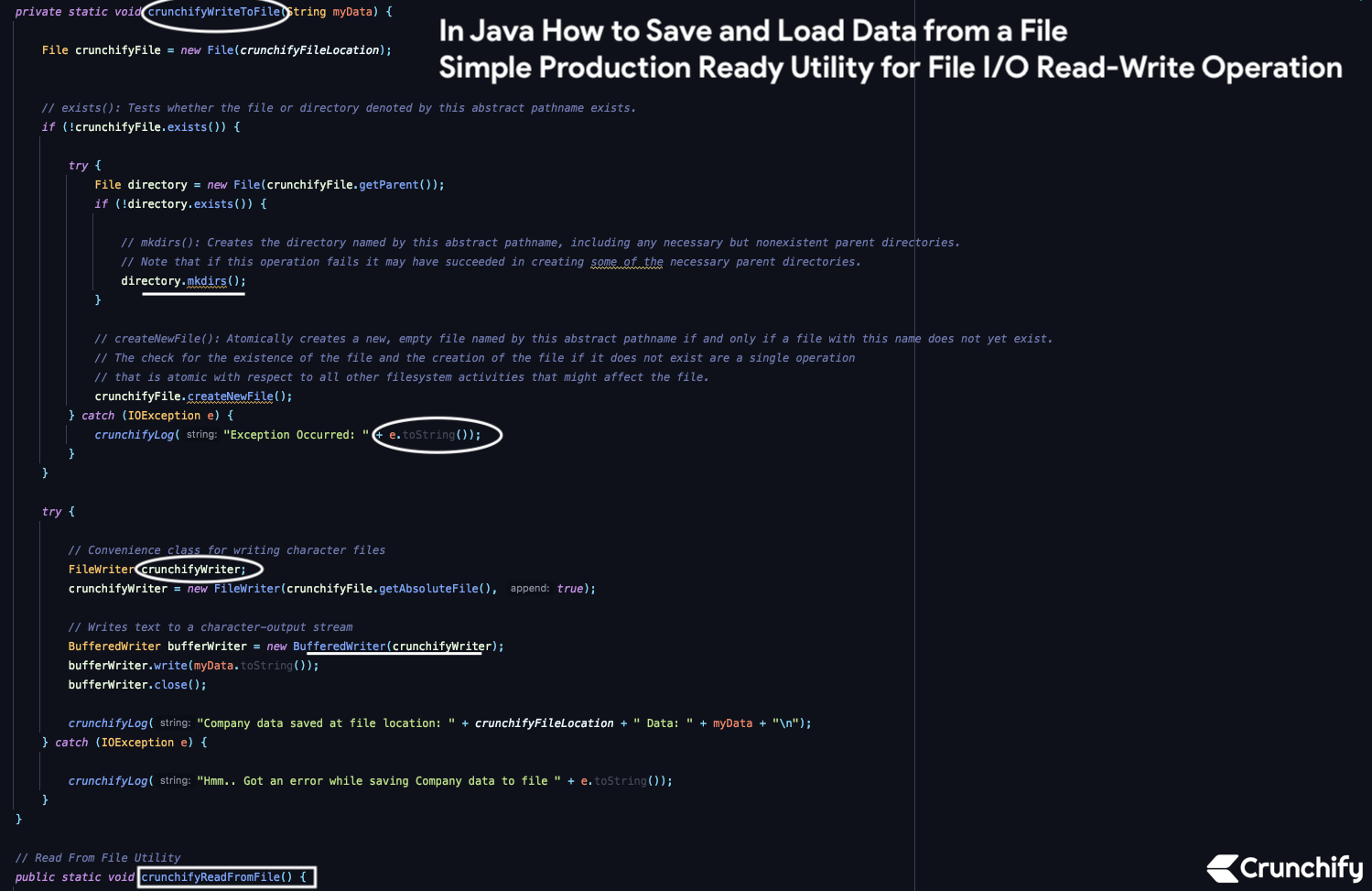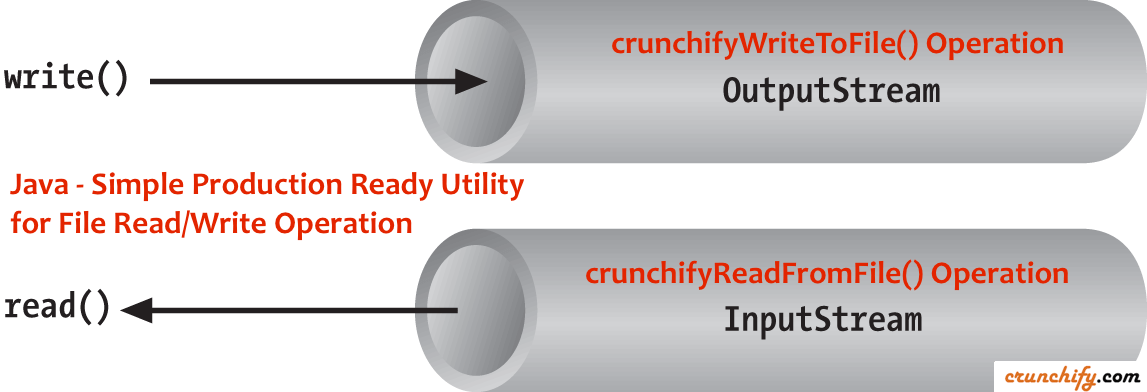В Java Как сохранить и загрузить данные из файла — простая готовая утилита для операций чтения-записи файлового ввода-вывода
Опубликовано: 2020-10-11
Как записать объект в файл и прочитать его обратно?
Java довольно удивительна с большим количеством API, а с Java 8 мы полностью включены с большим количеством API, таких как Lambda, справочник по методам, методы по умолчанию, улучшенный интерфейс типов, повторяющиеся аннотации, отражения параметров метода и многое другое.
Некоторое время назад я написал статью о том, как читать объект JSON из файла в Java. Это была простая операция чтения Java. Но в этом уроке мы собираемся save and load данные из файла с помощью простой утилиты Java, готовой к производству.

Мы не только сохраняем простой объект, но и создадим простой Java POJO типа CrunchifyCompany и будем сохранять и извлекать объект с помощью GSON . Вам нужна зависимость ниже, чтобы запустить программу ниже.
Поместите ниже зависимость от вашего проекта maven. Если у вас есть динамический веб-проект и вы хотите преобразовать его в проект Maven, выполните следующие действия.
|
1 2 3 4 5 |
< dependency > < groupId > com . google . code . gson < / groupId > < artifactId > gson < / artifactId > < version > 2.3 < / version > < / dependency > |
Вот поток:
- Создайте класс
CrunchifyReadWriteUtilityForFile.java - Создайте частный внутренний класс
CrunchifyCompanyс двумя полями- частные
employees; - частная строка
companyName;
- частные
- Создать объект
crunchifyвнутри основного метода - Преобразуйте объект в
Gson, чтобы он был сохранен в файл - Используйте метод
crunchifyWriteToFileдля сохранения данных в файл в Java. - Используйте метод
crunchifyReadFromFileдля извлечения данных из файла в Java
Вот полный пример:
|
1 2 3 4 5 6 7 8 9 10 11 12 13 14 15 16 17 18 19 20 21 22 23 24 25 26 27 28 29 30 31 32 33 34 35 36 37 38 39 40 41 42 43 44 45 46 47 48 49 50 51 52 53 54 55 56 57 58 59 60 61 62 63 64 65 66 67 68 69 70 71 72 73 74 75 76 77 78 79 80 81 82 83 84 85 86 87 88 89 90 91 92 93 94 95 96 97 98 99 100 101 102 103 104 105 106 107 108 109 110 111 112 113 114 115 116 117 118 119 120 121 122 123 124 125 126 127 128 129 130 131 132 133 134 135 136 137 138 139 |
package crunchify . com . tutorial ; import com . google . gson . Gson ; import com . google . gson . stream . JsonReader ; import java . io . * ; import java . nio . charset . StandardCharsets ; /** * @author Crunchify.com * Best and simple Production ready utility to save/load * (read/write) data from/to file */ public class CrunchifyReadWriteUtilityForFile { private static final String crunchifyFileLocation = "/Users/appshah/Documents/crunchify.txt" ; private static final Gson gson = new Gson ( ) ; // CrunchifyComapny Class with two fields // - Employees // - CompanyName private static class CrunchifyCompany { private int employees ; private String companyName ; public int getEmployees ( ) { return employees ; } public void setEmployees ( int employees ) { this . employees = employees ; } public String getCompanyName ( ) { return companyName ; } public void setCompanyName ( String companyName ) { this . companyName = companyName ; } } // Main Method public static void main ( String [ ] args ) { CrunchifyCompany crunchify = new CrunchifyCompany ( ) ; crunchify . setCompanyName ( "Crunchify.com" ) ; crunchify . setEmployees ( 4 ) ; // Save data to file crunchifyWriteToFile ( gson . toJson ( crunchify ) ) ; // Retrieve data from file crunchifyReadFromFile ( ) ; } // Save to file Utility private static void crunchifyWriteToFile ( String myData ) { File crunchifyFile = new File ( crunchifyFileLocation ) ; // exists(): Tests whether the file or directory denoted by this abstract pathname exists. if ( ! crunchifyFile . exists ( ) ) { try { File directory = new File ( crunchifyFile . getParent ( ) ) ; if ( ! directory . exists ( ) ) { // mkdirs(): Creates the directory named by this abstract pathname, including any necessary but nonexistent parent directories. // Note that if this operation fails it may have succeeded in creating some of the necessary parent directories. directory . mkdirs ( ) ; } // createNewFile(): Atomically creates a new, empty file named by this abstract pathname if and only if a file with this name does not yet exist. // The check for the existence of the file and the creation of the file if it does not exist are a single operation // that is atomic with respect to all other filesystem activities that might affect the file. crunchifyFile . createNewFile ( ) ; } catch ( IOException e ) { crunchifyLog ( "Exception Occurred: " + e . toString ( ) ) ; } } try { // Convenience class for writing character files FileWriter crunchifyWriter ; crunchifyWriter = new FileWriter ( crunchifyFile . getAbsoluteFile ( ) , true ) ; // Writes text to a character-output stream BufferedWriter bufferWriter = new BufferedWriter ( crunchifyWriter ) ; bufferWriter . write ( myData . toString ( ) ) ; bufferWriter . close ( ) ; crunchifyLog ( "Company data saved at file location: " + crunchifyFileLocation + " Data: " + myData + "\n" ) ; } catch ( IOException e ) { crunchifyLog ( "Hmm.. Got an error while saving Company data to file " + e . toString ( ) ) ; } } // Read From File Utility public static void crunchifyReadFromFile ( ) { // File: An abstract representation of file and directory pathnames. // User interfaces and operating systems use system-dependent pathname strings to name files and directories. File crunchifyFile = new File ( crunchifyFileLocation ) ; if ( ! crunchifyFile . exists ( ) ) crunchifyLog ( "File doesn't exist" ) ; InputStreamReader isReader ; try { isReader = new InputStreamReader ( new FileInputStream ( crunchifyFile ) , StandardCharsets . UTF_8 ) ; JsonReader myReader = new JsonReader ( isReader ) ; CrunchifyCompany company = gson . fromJson ( myReader , CrunchifyCompany . class ) ; crunchifyLog ( "Company Name: " + company . getCompanyName ( ) ) ; int employee = company . getEmployees ( ) ; crunchifyLog ( "# of Employees: " + Integer . toString ( employee ) ) ; } catch ( Exception e ) { crunchifyLog ( "error load cache from file " + e . toString ( ) ) ; } crunchifyLog ( "\nCompany Data loaded successfully from file " + crunchifyFileLocation ) ; } private static void crunchifyLog ( String string ) { System . out . println ( string ) ; } } |
Вывод консоли Eclipse:
|
1 2 3 4 5 6 |
Company data saved at file location : / Users / appshah / Documents / crunchify . txt Data : { "employees" : 4 , "companyName" : "Crunchify.com" } Company Name : Crunchify . com # of Employees: 4 Company Data loaded successfully from file / Users / appshah / Documents / crunchify . txt |
Вот содержимое файла crunchify.txt.
Поскольку я запускал программу two times , вы видите здесь JSONObject два раза, когда мы добавляем значение в файл crunchify.txt .


